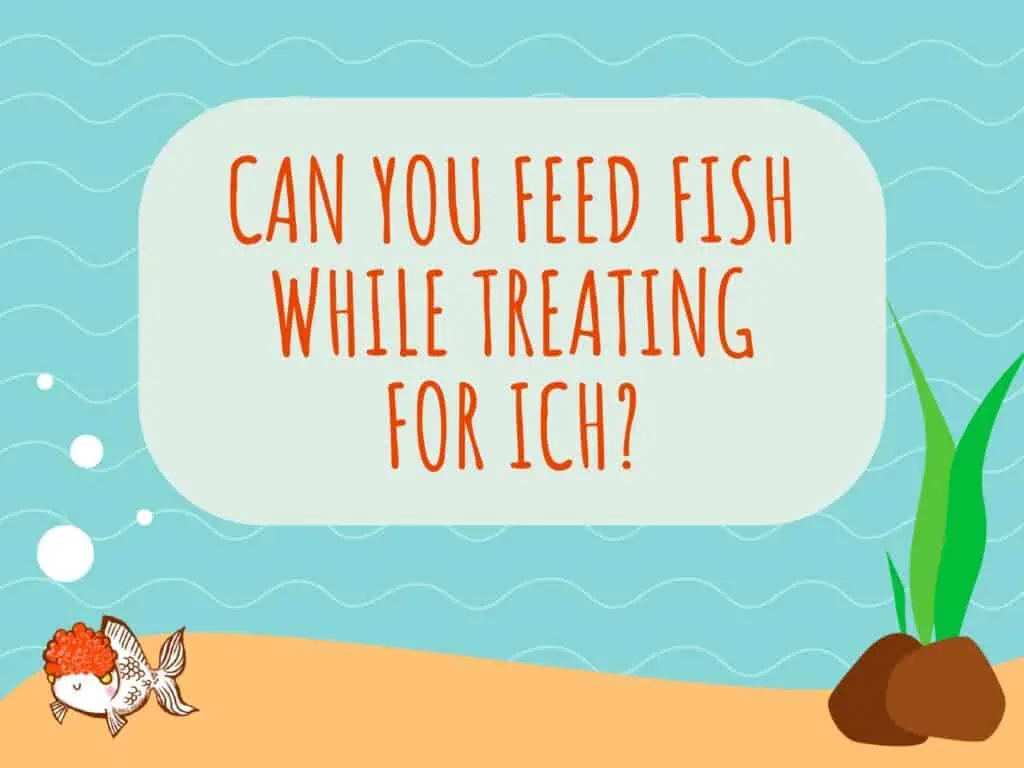If you’re treating your fish for ich, you might be wondering: Can I feed my fish while I’m treating them?
The answer is yes, you can, although your fish may simply just not want to eat at that time, and you shouldn’t force them. They may also appreciate different kinds of food at this time to help them recover.
Let’s recap on the basics of treating ich and then talk about feeding during the treatment time.
What Is Ich?
You’ll probably know by now, but it can be helpful to recap. Ich is an abbreviation for Ichthyophthirius multifiliis, a tiny parasite protozoan that is highly contagious.
These parasites go through a range of different life cycles in the aquarium, but the most obvious phase is when they’re embedded beneath the skin of your fish and appear as little white spots.
The appearance of this malady has led some people to call it ‘white spot disease.’
Infected fish will scratch and ‘itch’ themselves against rough surfaces in the aquarium such as rocks and gravel in an attempt to dislodge the parasites. They may also become lethargic and uninterested in food.
If left untreated, ich can be fatal.
How To Treat Ich
Raise the Aquarium Temperature
It’s normally recommended to raise the water temperature when treating ich. While some aquarists advise simply increasing the heat by 2-4°F, others recommend raising the heater’s thermostat to 86°F.
The optimum temperature depends on whether your fish can tolerate high temperatures, but the higher the temperature, the faster the life cycle of the ich will progress, and the quicker you can treat it.
Add Aquarium Salt
A tried and trusted method of treating ich is to add aquarium salt to the tank. It helps to kill the parasites, and also to heal the wounds on your fish.
But the amount of salt used must be measured very carefully. Certain catfish and members of the carp family are highly averse to strong salt concentrations and could easily become more sick from the salt than from the disease you’re trying to cure!
If your fish can tolerate high temperatures and high concentrations of salt, then these two methods might be enough to cure the illness. But in other cases, you’ll need to use medication.
Treating With Medication
If you’re going to medicate your fish with ich, you first need to remove any carbon media from your filter, since it will filter out the medication and render it ineffective.
There are several types of commercial ich treatments available on the market. Some of them contain copper which is very effective but can also kill certain invertebrates and plant species.
Always follow the manufacturer’s instructions very carefully, and treat the tank for the full recommended duration, even if symptoms appear to have improved.
To Finish Treatment, Make Some Partial Water Changes
After treatment has been completed, it’s normally recommended to make a 30% partial water change to begin removing the medication and salt from the water.
After repeated water changes, the medication should be fully removed, and you can reintroduce snails and other critters who may have been intolerant to the medication.
Will Fish Eat During Ich Treatment?
Whether or not your fish will eat while infected with ich depends on how sick they are.
You can probably relate. When you have a slight cold, it hardly affects your appetite, but a serious case of the flu can leave you not wanting to eat for days.
It’s the same for your fish. If they are seriously sick, their natural instincts may tell them to avoid eating much, if anything at all, for several days, or even up to a week.
Don’t try to force-feed them during this time. Just give them as much food as they can eat within a couple of minutes as usual. If they don’t finish all their food, remove anything that’s left uneaten, and feed them less next time.
What To Feed Your Fish During Ich Treatment?
During their ich treatment, your fish might eat less, but they’ll usually eat something. And some foods are going to be better than others for them for fighting off the infection.
Live and frozen foods that are high in vitamin C, for example, can help boost your fish’s immune system. Of course, live foods will have the highest vitamin contents of all, since freezing can reduce vitamin C contents by more than 50%.
Brine shrimp are an especially good source of vitamin C and have been shown to reduce stress in guppies in scientific studies.
Algae wafers are sometimes also fortified with vitamin C, and it’s not only plecos and ‘algae eaters’ who like them. Other fish will relish them too, especially if certain minerals are lacking in their diet.
Indeed, some brands claim that algae wafers help to support a healthy immune system.
Trust your fish as your natural indicator of which foods are best for them during treatment time. If they reject a certain food, try something else.
If they get particularly excited about another type of food, then perhaps it’s helping them with their immune response and they’d benefit from more of it.
Keep Your Tank Clean!
As I mentioned earlier, you must clean up any leftover food that your fish don’t eat, especially during treatment time!
Uneaten food is one of the biggest causes of poor quality, which in turn is one of the primary causes of poor health in fish and the likelihood of further infections.
Conclusion
Your fish may eat less, or even refuse to eat at all when being treated for ich, and in most cases, it’s simply a natural part of their recovery process.
If your fish are eating, then live foods and algae wafers could be some of the best options to top up your fish’s vitamin levels and boost their immune systems to help cure them of the infection.
To find out more about ich and how to treat it, check out our guide here.


